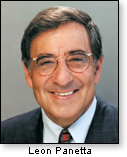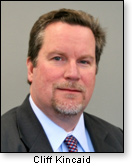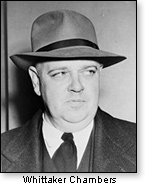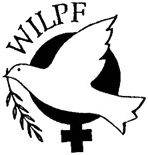
Wes Vernon
Top spy points finger at Panetta friend
Question: Why the reluctance to expose links to Communists?
By Wes Vernon
(See "Media Blackout," 6/13/11.)
A key leader of the Cold War-era Communist underground in the U.S. has verified the Communist affiliation of a man (Hugh DeLacy) who was a friend of the current CIA Director Leon Panetta. The latter's nomination to be Secretary of Defense has zipped through the Senate Armed Services Committee. A full Senate vote is expected (as of this writing) on Tuesday of this week. So there is little time to let your senators know your views.
 In his book Advocate and Activist: Memoirs of an American Communist Lawyer, John Abt writes the following:
In his book Advocate and Activist: Memoirs of an American Communist Lawyer, John Abt writes the following:
"The CPUSA [Communist Party] could not, in the American sense of politics, be a party that contended for power through the ballot. Rather we were to be the loyal opposition whose role was to push the Democrats to the left." (Note: This column leaves it to the reader to figure how that Communist goal has worked out over the years.)
And then Abt adds:
"The two Communists who were elected to Congress — John Bernard from Minnesota and Hugh DeLacy from Washington State — were elected as Democrats."
A key conspirator
At this point, it is relevant to explore just who John Abt was.
John Jacob Abt spent most of his legal career as chief counsel for the Communist Party. At one point during the Cold War, he was a key member — at one time the leader (according to Whittaker Chambers in his literary masterpiece Witness) — of the secret Ware Group.
The Ware Group operated underground in the nation's capital. It was a covert organization of Communist Party operatives within the U.S. government. It served to aid Soviet intelligence by passing information, as well as assisting the Communist Party. The spy ring held some of its meetings in Abt's Washington apartment.
Abt himself wormed his way into key government posts: the Agricultural Adjustment Administration (AAA); the Works Progress Administration (WPA); the Security and Exchange Commission (SEC); the Senate Subcommittee on Civil Liberties Violations (the LaFollette Civil Liberties Committee); and the Department of Justice (DOJ). In each of these posts, Mr. Abt held influential positions.
On November 22, 1963, after the assassination of President John F. Kennedy, Lee Harvey Oswald asked that he be represented by John Abt.
That is a thumbnail bio of the man who would later openly boast in writing of the Communist Party's ability to elect Hugh DeLacy to the Congress of the United States (albeit for one term before the voters dismissed him).
 That is one reason why Secretary of Defense nominee Leon Panetta's friendship with DeLacy (as outlined in the Kincaid/Loudon files which we have referenced in this column) is relevant in 2011.
That is one reason why Secretary of Defense nominee Leon Panetta's friendship with DeLacy (as outlined in the Kincaid/Loudon files which we have referenced in this column) is relevant in 2011.
The Hugh DeLacy papers
On Thursday, Cliff Kincaid appeared on the Mark Carbonero show (KION) in Panetta's former congressional district (1977-1993). There Kincaid mentioned that his investigative partner Trevor Loudon had actually traveled to the University of Washington where DeLacy's papers had been deposited upon his 1986 death.
 Kincaid explained: "And sure enough, there's a series of letters there between Panetta and DeLacy — 'Dear Hugh' 'Dear Leon' letters — in which basically Panetta's at the beck and call of DeLacy, even offering him some sensitive document he had gotten while a member of Congress."
Kincaid explained: "And sure enough, there's a series of letters there between Panetta and DeLacy — 'Dear Hugh' 'Dear Leon' letters — in which basically Panetta's at the beck and call of DeLacy, even offering him some sensitive document he had gotten while a member of Congress."
Carbonero: What were those documents pertaining to?
Kincaid: A U.S. military and foreign policy. And you know, this is why we've raised the question of how Panetta, with this relationship — which I think makes him a security risk — ever got the CIA Director position in the first place, and we're trying desperately to get the Senate to raise questions as to whether he should go on to another sensitive post of Secretary of Defense.
CARBONERO: There's a real problem with Communists and the Democratic Party. There may have been a few instances of Communists within the Republican Party, but you know, for some reason, there are Communists and Communist sympathizers within the Democratic Party.
Why? A possible answer
Mr. Carbonero raises an interesting question, and to explore it, we return to Whittaker Chambers — the ex-Communist who exposed Alger Hiss.
In Witness, Mr. Chambers reveals his failed effort in 1939 to interest the Roosevelt administration in facing up to the nest of Communists in its New Deal government.
At that point, Chambers writes, "I took my first hard look at the New Deal," adding that "all the New Dealers I had known were Communists."
He went on to describe the New Deal as "a coalition of divergent interests" that concealed "an inner drift of this great movement. That drift was prevailingly toward socialism, though the mass of those who in part directed, [or] in part were carried along by it, sincerely supposed that they were liberals."
What Chambers came to realize was that while this was "not a revolution of violence," it assuredly was "a revolution by bookkeeping and lawmaking."
And then this:
 "For as between the revolutionists who only half know what they are doing and the revolutionists who know exactly what they are doing, the latter are in a superb maneuvering position. At the basic point of the revolution — the shift of power from business to government — the two kinds of revolutionists are at one; and they shared many dreams and hopes. Thus men who sincerely abhorred the word Communism, in the common ends found that they were unable to distinguish Communists from themselves."
"For as between the revolutionists who only half know what they are doing and the revolutionists who know exactly what they are doing, the latter are in a superb maneuvering position. At the basic point of the revolution — the shift of power from business to government — the two kinds of revolutionists are at one; and they shared many dreams and hopes. Thus men who sincerely abhorred the word Communism, in the common ends found that they were unable to distinguish Communists from themselves."
In the nearly six decades since Chambers wrote those words, the alliance he describes — communists and liberals — has hardened.
Then as now: the more things change...
So why is there such reluctance on the part of the media and in the U.S. Senate to confront the fact that the CIA Director — now up for confirmation as Secretary of Defense — has had close friendly relations with a man who was a willing puppet of Moscow during the Cold War?
Again, we return to Witness:
"Any charge of Communism enrages them precisely because they could not grasp the differences between themselves and those against whom it was made."
Carbonero and Kincaid — in their radio discussion of Panettagate — noted that there would be a media uproar if, instead of Communism, a person in high office had an affinity for Nazis or Ku Kluxers.
True — but also ironic, given that the official name of the Nazi Party was the National Socialist German Workers Party, and that a revered Democrat icon — Woodrow Wilson — hosted a White House showing of a film produced by the Ku Klux Klan. But no matter, facts are not relevant when emotions trump reason.
The predictably "enraged" reaction on the part of liberals — to any public focus on the similarities between their views and those of Communists — explains why they want to bury this Panettagate scandal. Any conservative reluctance to face up to it probably stems from a desire not to wade into the thicket of the sheer venom engendered by the enraged and their media echo chamber.
More revelations
But from the "alternative media," the parade of new Panettagate information from the Kincaid/Loudon files continues.
 Among the latest is Congressman Panetta's praise in 1984 of a constituent for her work in the pro-Soviet Women's International League for Peace and Freedom (WILPF). That same constituent, Lucy Haessler, had also participated in "peace conferences" that were held by the Women's International Democratic Federation (WIDF) in four locations around the world, three of which were in what were then Iron Curtain countries, including the Soviet Union itself. The WIDF was, writes Kincaid, "an outright Soviet front organization."
Among the latest is Congressman Panetta's praise in 1984 of a constituent for her work in the pro-Soviet Women's International League for Peace and Freedom (WILPF). That same constituent, Lucy Haessler, had also participated in "peace conferences" that were held by the Women's International Democratic Federation (WIDF) in four locations around the world, three of which were in what were then Iron Curtain countries, including the Soviet Union itself. The WIDF was, writes Kincaid, "an outright Soviet front organization."
At the time, Panetta told Human Events that he was unaware of the extremist nature of the WILPF.
Director Panetta's credibility would surely go south if he were to say he also was unaware of the Communist background of Hugh DeLacy, an identified party member. Congressman Panetta did praise DeLacy for his stand against "McCarthyism" — a leftist trigger word coined in Moscow.
The liberal half of the enraged leftist alliance (referenced above) would prefer all that nasty business not be discussed — just when Panetta's path to the post of Secretary of Defense appears to be the proverbial slam dunk.
© Wes Vernon
June 20, 2011
(See "Media Blackout," 6/13/11.)
A key leader of the Cold War-era Communist underground in the U.S. has verified the Communist affiliation of a man (Hugh DeLacy) who was a friend of the current CIA Director Leon Panetta. The latter's nomination to be Secretary of Defense has zipped through the Senate Armed Services Committee. A full Senate vote is expected (as of this writing) on Tuesday of this week. So there is little time to let your senators know your views.
 In his book Advocate and Activist: Memoirs of an American Communist Lawyer, John Abt writes the following:
In his book Advocate and Activist: Memoirs of an American Communist Lawyer, John Abt writes the following:"The CPUSA [Communist Party] could not, in the American sense of politics, be a party that contended for power through the ballot. Rather we were to be the loyal opposition whose role was to push the Democrats to the left." (Note: This column leaves it to the reader to figure how that Communist goal has worked out over the years.)
And then Abt adds:
"The two Communists who were elected to Congress — John Bernard from Minnesota and Hugh DeLacy from Washington State — were elected as Democrats."
A key conspirator
At this point, it is relevant to explore just who John Abt was.
John Jacob Abt spent most of his legal career as chief counsel for the Communist Party. At one point during the Cold War, he was a key member — at one time the leader (according to Whittaker Chambers in his literary masterpiece Witness) — of the secret Ware Group.
The Ware Group operated underground in the nation's capital. It was a covert organization of Communist Party operatives within the U.S. government. It served to aid Soviet intelligence by passing information, as well as assisting the Communist Party. The spy ring held some of its meetings in Abt's Washington apartment.
Abt himself wormed his way into key government posts: the Agricultural Adjustment Administration (AAA); the Works Progress Administration (WPA); the Security and Exchange Commission (SEC); the Senate Subcommittee on Civil Liberties Violations (the LaFollette Civil Liberties Committee); and the Department of Justice (DOJ). In each of these posts, Mr. Abt held influential positions.
On November 22, 1963, after the assassination of President John F. Kennedy, Lee Harvey Oswald asked that he be represented by John Abt.
That is a thumbnail bio of the man who would later openly boast in writing of the Communist Party's ability to elect Hugh DeLacy to the Congress of the United States (albeit for one term before the voters dismissed him).
 That is one reason why Secretary of Defense nominee Leon Panetta's friendship with DeLacy (as outlined in the Kincaid/Loudon files which we have referenced in this column) is relevant in 2011.
That is one reason why Secretary of Defense nominee Leon Panetta's friendship with DeLacy (as outlined in the Kincaid/Loudon files which we have referenced in this column) is relevant in 2011.The Hugh DeLacy papers
On Thursday, Cliff Kincaid appeared on the Mark Carbonero show (KION) in Panetta's former congressional district (1977-1993). There Kincaid mentioned that his investigative partner Trevor Loudon had actually traveled to the University of Washington where DeLacy's papers had been deposited upon his 1986 death.
 Kincaid explained: "And sure enough, there's a series of letters there between Panetta and DeLacy — 'Dear Hugh' 'Dear Leon' letters — in which basically Panetta's at the beck and call of DeLacy, even offering him some sensitive document he had gotten while a member of Congress."
Kincaid explained: "And sure enough, there's a series of letters there between Panetta and DeLacy — 'Dear Hugh' 'Dear Leon' letters — in which basically Panetta's at the beck and call of DeLacy, even offering him some sensitive document he had gotten while a member of Congress."Carbonero: What were those documents pertaining to?
Kincaid: A U.S. military and foreign policy. And you know, this is why we've raised the question of how Panetta, with this relationship — which I think makes him a security risk — ever got the CIA Director position in the first place, and we're trying desperately to get the Senate to raise questions as to whether he should go on to another sensitive post of Secretary of Defense.
CARBONERO: There's a real problem with Communists and the Democratic Party. There may have been a few instances of Communists within the Republican Party, but you know, for some reason, there are Communists and Communist sympathizers within the Democratic Party.
Why? A possible answer
Mr. Carbonero raises an interesting question, and to explore it, we return to Whittaker Chambers — the ex-Communist who exposed Alger Hiss.
In Witness, Mr. Chambers reveals his failed effort in 1939 to interest the Roosevelt administration in facing up to the nest of Communists in its New Deal government.
At that point, Chambers writes, "I took my first hard look at the New Deal," adding that "all the New Dealers I had known were Communists."
He went on to describe the New Deal as "a coalition of divergent interests" that concealed "an inner drift of this great movement. That drift was prevailingly toward socialism, though the mass of those who in part directed, [or] in part were carried along by it, sincerely supposed that they were liberals."
What Chambers came to realize was that while this was "not a revolution of violence," it assuredly was "a revolution by bookkeeping and lawmaking."
And then this:
 "For as between the revolutionists who only half know what they are doing and the revolutionists who know exactly what they are doing, the latter are in a superb maneuvering position. At the basic point of the revolution — the shift of power from business to government — the two kinds of revolutionists are at one; and they shared many dreams and hopes. Thus men who sincerely abhorred the word Communism, in the common ends found that they were unable to distinguish Communists from themselves."
"For as between the revolutionists who only half know what they are doing and the revolutionists who know exactly what they are doing, the latter are in a superb maneuvering position. At the basic point of the revolution — the shift of power from business to government — the two kinds of revolutionists are at one; and they shared many dreams and hopes. Thus men who sincerely abhorred the word Communism, in the common ends found that they were unable to distinguish Communists from themselves."In the nearly six decades since Chambers wrote those words, the alliance he describes — communists and liberals — has hardened.
Then as now: the more things change...
So why is there such reluctance on the part of the media and in the U.S. Senate to confront the fact that the CIA Director — now up for confirmation as Secretary of Defense — has had close friendly relations with a man who was a willing puppet of Moscow during the Cold War?
Again, we return to Witness:
"Any charge of Communism enrages them precisely because they could not grasp the differences between themselves and those against whom it was made."
Carbonero and Kincaid — in their radio discussion of Panettagate — noted that there would be a media uproar if, instead of Communism, a person in high office had an affinity for Nazis or Ku Kluxers.
True — but also ironic, given that the official name of the Nazi Party was the National Socialist German Workers Party, and that a revered Democrat icon — Woodrow Wilson — hosted a White House showing of a film produced by the Ku Klux Klan. But no matter, facts are not relevant when emotions trump reason.
The predictably "enraged" reaction on the part of liberals — to any public focus on the similarities between their views and those of Communists — explains why they want to bury this Panettagate scandal. Any conservative reluctance to face up to it probably stems from a desire not to wade into the thicket of the sheer venom engendered by the enraged and their media echo chamber.
More revelations
But from the "alternative media," the parade of new Panettagate information from the Kincaid/Loudon files continues.
 Among the latest is Congressman Panetta's praise in 1984 of a constituent for her work in the pro-Soviet Women's International League for Peace and Freedom (WILPF). That same constituent, Lucy Haessler, had also participated in "peace conferences" that were held by the Women's International Democratic Federation (WIDF) in four locations around the world, three of which were in what were then Iron Curtain countries, including the Soviet Union itself. The WIDF was, writes Kincaid, "an outright Soviet front organization."
Among the latest is Congressman Panetta's praise in 1984 of a constituent for her work in the pro-Soviet Women's International League for Peace and Freedom (WILPF). That same constituent, Lucy Haessler, had also participated in "peace conferences" that were held by the Women's International Democratic Federation (WIDF) in four locations around the world, three of which were in what were then Iron Curtain countries, including the Soviet Union itself. The WIDF was, writes Kincaid, "an outright Soviet front organization."At the time, Panetta told Human Events that he was unaware of the extremist nature of the WILPF.
Director Panetta's credibility would surely go south if he were to say he also was unaware of the Communist background of Hugh DeLacy, an identified party member. Congressman Panetta did praise DeLacy for his stand against "McCarthyism" — a leftist trigger word coined in Moscow.
The liberal half of the enraged leftist alliance (referenced above) would prefer all that nasty business not be discussed — just when Panetta's path to the post of Secretary of Defense appears to be the proverbial slam dunk.
© Wes Vernon
The views expressed by RenewAmerica columnists are their own and do not necessarily reflect the position of RenewAmerica or its affiliates.
(See RenewAmerica's publishing standards.)



















